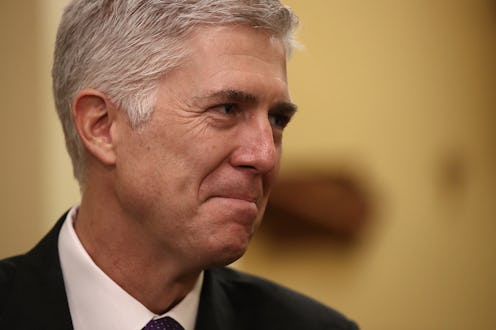News
Gorsuch's SCOTUS Confirmation Battle Is Headed To The Senate

After a whopping 401 days of vacancy the Senate will finally move toward attempting to fill the Supreme Court seat left open by conservative Justice Antonin Scalia's death in early 2016. Senate confirmation hearings for Neil Gorsuch, a federal appellate judge nominated to the Supreme Court by President Donald Trump, are set to begin Monday. But how likely is it that Gorsuch will be confirmed to the Supreme Court and how contentious might his confirmation hearings get?
According to NPR, Gorsuch has spent the weeks since his nomination was announced meeting "privately with 72 senators" and engaging in mock hearings with the help of the Trump administration. In essence, expect him to show up to the Senate Judiciary Committee prepared to be grilled. Yet even with the effort Gorsuch has reportedly put in to building a rapport with senators and practicing his answers, don't expect his confirmation process to wrap up too quickly.
Although Gorsuch certainly has the legal credentials for a seat on the Supreme Court given his 10 years at the U.S. Court of Appeals for the 10th Circuit in Denver, Democrats have already begun criticizing his conservative judicial philosophy. They're arguing his rulings have favored big business and government interests at the expense of the "little guy."
"Gorsuch might act like a neutral, calm judge, but his record and his career clearly show he harbors a right-wing, pro-corporate, special interest agenda," Senate Minority Leader Chuck Schumer told reporters at a press conference March 15. "Far too often, he sides with the powerful few over everyday Americans trying to just get a fair shake."
Republicans, meanwhile, appear optimistic about Gorsuch's chances of being sworn in sometime in early April. "Hopefully a week from Thursday, I'm able to tell you he has done such a good job in answering questions that anyone would be embarrassed to take him on," Republican Senator and Senate Judiciary Committee Chairman Chuck Grassley recently told VOA. "I have a feeling that that's the way it's going to work out."
Although it's impossible to say if Gorsuch's confirmation will turn out to be a bitter partisan battle or a surprise snooze-fest (things are already leaning toward the former), Republicans may have good reason for feeling optimistic about the process. Because Republicans holding the Senate majority at 52, it's hard to say if Democrats will be able to muster the 60-vote super majority needed to block Gorsuch's confirmation without attempting a filibuster. However, even if Democrats did attempt to derail Gorsuch's confirmation through a filibuster, Republicans could resort to using the so-called "nuclear-option," voting to remove either the filibuster rule or the super-majority requirement for SCOTUS confirmations.
Should Gorsuch be confirmed to the Supreme Court his presence would restore the narrow 5-4 conservative majority that Justice Scalia had brought to the bench.